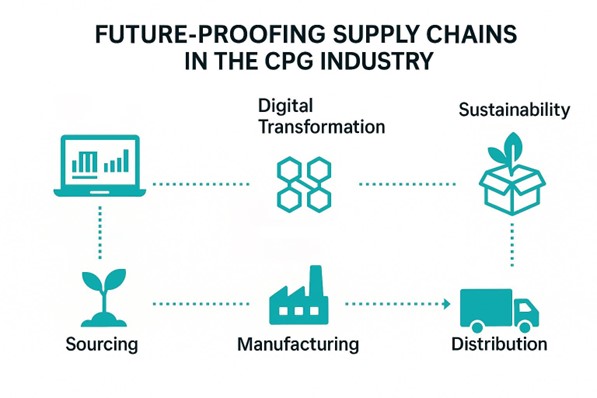As the world’s population grows, the CPG (consumer packaged goods) market is escalating to meet the general public’s requirements. And because of the rising demand, the industry stands at a crossroads of reinvention and huge disruption in the coming era.
CPG companies are altering their business models following shifting priorities, environmental pressures, continuous inflationary concerns, and expanding technology prowess. They are adopting sustainable, innovative, and digital-first strategies to stay ahead of the competition.
Over time, vulnerabilities and weaknesses of crooked supply chains got exposed, highlighting the importance of sustainable frameworks to meet the hyper-personalized requirements for customer engagement.
As the industry adapts to shifting demands, many brands are collaborating with CPG consulting experts to identify operational gaps and build more resilient, future-ready business models.

The Rise of the Conscious, Connected Consumer
In today’s era, CPG consumers are getting smarter, connected, informed, and value-driven. The fundamental shift is visible in their behavior, courtesy of growing affinity toward the environment, digital accessibility, and social impact, which are changing brand loyalty, product marketing, and development in the long run.
a) Sustainability is Non-Negotiable
The current generation, specifically Gen Z and millennials, is quite on point when making decisions and purchasing that fall under the category of CPG. They pick brands that satisfy their values, which include climate-friendly packaging, fair labor practices, and carbon and plastic reduction.
According to a survey conducted by NielsenIQ, a staggering 73% of global consumers willingly pay more for sustainable products.
Brands are embedding sustainability principles into product development, sourcing, and packaging—often with support from sustainability strategy consulting teams who bring regulatory and environmental insight.
b) Digital Engagement
Modern consumers are interested in omnichannel and seamless experiences and expect purchasing support. They also want to engage with digitalization, such as subscription models, AI-powered personalization, mobile commerce, and AR try-ons.
c) Multifunctional Products
Consumers are opting for products that provide multiple benefits in a single purchase, following lifestyle and economic challenges. They want products that come with added wellness and hybrid skincare utilities or household ones. Responding to multifunctional product demand often requires cross-functional teams informed by insights from CPG consultants with deep category expertise.
Foster a Culture of Innovation
The CPG landscape is for companies that can work on innovation to keep up with a quickly evolving market.
- Cross-Functional Teams: CPG companies that are looking to get ahead should focus on collaboration with R&D, supply chain teams, and marketing to drive efficiency and creativity.
- Product Development: Implementation of methodologies to expedite product launches based on customer feedback, along with iteration, can make things better for CPG manufacturers.
- Open Innovation: Partnering with apt startups, external organizations, and research institutions can offer strategies and technologies that generate innovations.
Prepare for Regulatory Change
CPG companies that require growth must prepare themselves for the regulatory landscape beforehand, including complex regulations around data privacy, sustainability, and health claims.
- Proactive Compliance: It is important to invest in monitoring legislative developments, continuous engagement with policymakers, and investing in compliance teams to stay ahead of the curve of shifting regulations.
- Sustainability Standards: Industry parameters for social responsibility and environment must be followed by companies, for example, B Corp certification or the Global Reporting Initiative (GRI).
- Consumer Education: It is important for CPG firms to follow the compliance regulations and spread awareness among consumers regarding regulations regarding product sustainability and safety with clarity.
Global Policies on the Radar
Several nations have mandated various guidelines that need to be followed by CPG brands to stay within compliance:
- EU Green Deal: The rule requires climate-neutral production by 2050, which needs to be followed by companies to stay in the fray until the next era.
- EPR Laws: Extended Producer Responsibility laws rule CPG companies to ensure the full packaging lifecycle.
- India’s Plastic Waste Management: The country has brought a rule to inflict heavy penalties on companies that are not compliant with the packaging material used. The regulation was introduced in 2024.
Navigating international regulatory shifts—from the EU Green Deal to India’s plastic rules—often involves guidance from CPG consulting firms familiar with local and global compliance trends.
Future-Proofing Supply Chains in a Volatile World

Global supply chains are going through a rigorous churn due to several issues, including geopolitical issues, labor shortages, port congestion, and rising energy costs. Thus, CPG businesses require diversified supply networks coupled with technology and resilience to absorb and anticipate shocks.
a. From Linear to Intelligent Supply Chains
The days are gone when next-generation supply chains were reactive. Now, they are powered by proactive and predictive-enabled AI-driven risk management platforms, digital twins, and real-time dashboards.
To build more responsive and resilient supply chains, many industry leaders are incorporating insights from CPG consulting companies on digitalization and regional sourcing models.
b. Regionalization & Localization
Making regional supply chains exceptional and through localized manufacturing to reduce dependence on single-source suppliers and cross-border delays, many companies are embracing regional supply chains and localized manufacturing. It helps reduce lead times and meet customers’ demand for locally manufactured items.
Accelerating Innovation Through Digital Transformation
Digital transformation is the key to productivity for every industry, including CPG. Thus, establishing infrastructure can help companies be smarter and make more personalized and precise decisions for consumers.
Some of the technological integrations that are enterprising the market are:
a. Machine Learning and Artificial Intelligence for Smart Decision-Making
CPG companies can perceive immense assistance from personalizing marketing to forecasting requirements to optimize costs through machine learning and artificial intelligence.
- Predictive Analytics: It can help optimize marketing campaigns and increase their effectiveness, enhance distribution performance, and increase packaging demand.
- AI-driven Customer Care: The support can significantly reduce the costs incurred to satisfy consumers and offer business growth
- Dynamic Pricing: Price adjustments can be made using technology that can look into market demand, inventory levels, and competition across channels.
CPG companies adopting AI across forecasting, pricing, and customer engagement often do so with the guidance of strategy experts.
b. Blockchain IoT & AR Integration
- IoT Sensors: They can be crucial in tracking movement, product conditions, and overall enhancing quality control in the CPG market.
- Blockchain: It empowers the brand with traceability in sourcing, offering transparency, and boosting business growth by gaining consumer trust.
- AR/VR Tools elevate product demos and in-store engagement, especially in categories like beauty and electronics.
Emerging technologies like IoT and blockchain are gaining traction in the CPG space, with implementation strategies often informed by industry advisors.
Conclusion: Leading in the Next Era of CPG
The next era of CPG will see innovations and sustainable strategies getting implemented through technological integration beyond imagination, led by the purpose of delivering quality and effective products to consumers. Moreover, brands that focus on enhancing user experience, improving the value chain, and embracing digital transformation will most likely emerge as industry leaders in the coming time.
However, making those correct moves with insights and clarity will require strategic guidance. Strategy consulting firms can help CPG companies leverage behavioral analytics with psychographic trend mapping and consumer segmentation. The consultancy company can assist in building market-aligned product planning, identifying strategic partners, designing roadmaps for climate action, and ESG integration, along with optimizing innovation ROI thro







